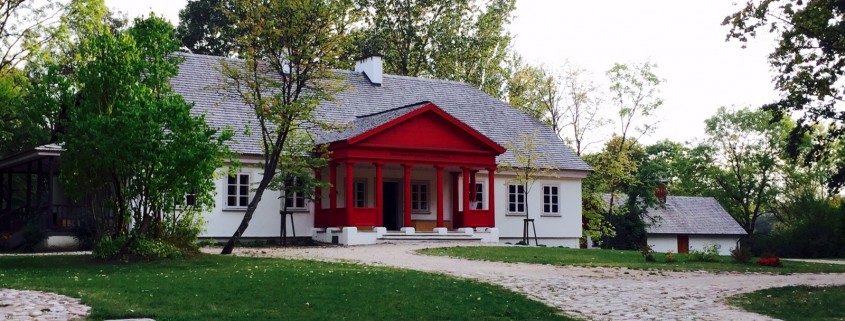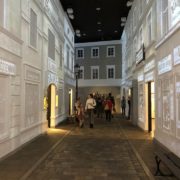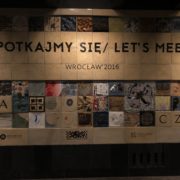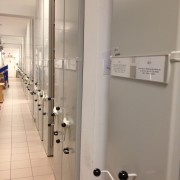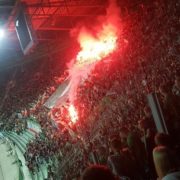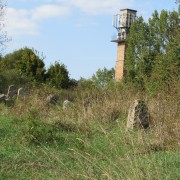Creating Identity Through Dialogue
By Domenica V. Vera
If there were any place I would choose to live in for the rest of my life, I would honestly and proudly answer “Krasnogruda.” During our 4-day stay, I did more self-reflecting than I have done in 19 years. Being in “The Manor” was life changing. I got in touch with who I was and discovered how I can help others discover who they are. The reflections create a connection between identity and citizenship.
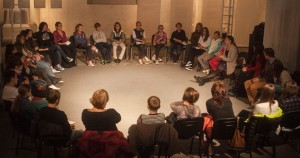
Workshop promoting dialogue among the Ukrainian students. Photo credit: Borderland Foundation’s Facebook page
I want to begin by telling you a little about myself. I was born in Guayaquil, Ecuador and immigrated to the United States when I was 3 years old. Ecuador is a small country between Colombia and Peru, located on the equator. The population of Ecuadorians living in Florida is 60,574, which is about .6% of the population there. As an Ecuadorian immigrant in the United States, more specifically South Florida, it was always difficult for me to find any connection with my country of birth. My whole life I have been surrounded by non-Ecuadorians and had very little recollection of my culture. But even though I had no memory of my life in Ecuador, living in the U.S. was a lot like being a tourist. I was never fully ‘American’, it always felt as though I was on the outer rims of society—trying to decide between going in and being rejected, or leaving and becoming lost somewhere else.
Ironically enough, a trip to a small Polish town gave me a relief from this outcast state. Krasnogruda made me feel as though I was home. It made me feel as though I was in Ecuador. Even though it looked nothing like the South American tropic I remember vaguely from childhood, I felt more at home in a small town in Poland than in the country I have lived in for 16 years.
Krasnogruda made me grasp the idea that culture can be generated through dialogue. The Borderlands Foundation and the International Center of Dialogue reminded me that a border, or in my case an ocean, doesn’t separate culture or tradition.
A border is defined as being “a line that separates one country, state, province, etc., from another; frontier line.” What many people fail to notice is that this line of separation is more harmful than beneficial. This separation creates misinformation of traditions and beliefs of other cultural groups. Rather than separating, a border should unify two areas. Throughout this border their needs to be dialogue so that we can learn from each other. We can learn a lot from a culture throughout dialogue. A civil society can only be accomplished when people understand and implement the value of appreciation and love of different cultures, ethnicities, races, and religion through everyday human interaction.
We began our stay with a discussion with Krysztof Czyżewski. Krysztof is one of the founders of the Borderland Foundation as well as an activist and an artist. His idea for the foundation was to understand the history and culture of the town and advance towards a more civil society.
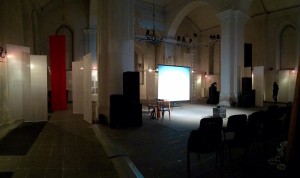
Old Synogogue, now used by the Borderlands Foundation to help preserve Jewish culture. Taken by Monica Pellerano
I commend the Borderlands Foundation for their efforts to work on reconciliation and intercultural dialogue in their region. The Borderlands Foundation is located along the northeastern border between Poland, Lithuania, and Belarus in the small town of Sejny. This region was home to many cultures and was later destroyed. In 1990, four young artists founded the Borderlands Foundation. The grassroots foundation focuses on promoting dialogue among different cultures. Before the foundation was created, citizens lived sheltered lives where they did not question or discover other traditions and beliefs that other neighboring groups may have. Separation and conflict were apparent in this region, thus igniting a call to action from the foundation.
The solution was to build an invisible bridge between these communities. They understood that a bridge cannot be built overnight and therefore needed consistency and support from others. If they didn’t do it right away, it would never be done. The foundation had a timeline and was patient with the development of the bridge. They also experienced many failures. The work of the foundation motivated the people of the surrounding area to gather and tell local stories about their lives and experiences. Through these stories, different cultures and religions began to be drawn into the light, and were being taught to others who had had no knowledge of them beforehand.
We were able to experience a workshop of Ukrainian students in the International Center for Dialogue. The workshop began with the students presenting stories to each other about their childhood and what they learned from their parents and grandparents. They were also asked to tell stories about lullabies, toys, games, flavors, outfits, fears and secrets of their childhood. This was used to show how similar yet different the students’ upbringing has been. Even though everyone had a different story to tell, they were all linked by their differences. The facilitators used these stories to compile a movie to show the beauty in the differences and similarities of the participants’ childhoods. They were learning from each through dialogue and through the collaborative process of creating this short animated film.
This experience made me realize that I had a lot in common with these students from Ukraine. I was from a different background, culture, race, age, and religion than those students yet I learned so much from their lives in a span of 2 hours. As I sat there I was beginning to remember stories similar to theirs. Memories of my childhood were coming back, memories I had not thought of in years. These memories were of my traditions and beliefs; they make up who I am as a person today. I had not lost my identity as an Ecuadorian, nor had I adapted to a false identity during my time in the United States. I had created my own identity. My identity was personalized for me and created by me through my memories and experiences. The Borderlands Foundation helped me identify myself; I am an Ecuadorian-American.
I have made it a priority to start such dialogue once I return to Syracuse. Syracuse University is very diverse and I feel as though there is a lot of work to be done to support a civil society on campus. Students across the world need to understand how necessary and vital dialogue between different cultures, ethnicities, races, sexes, and religion is to a form a democratic civil society. I will build an invisible bridge on campus. I will use what I have learned to help others find their place and energy on campus.

